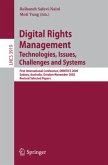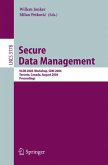The content industries consider Digital Rights Management (DRM) to contend with unauthorized downloading of copyrighted material, a practice that costs artists and distributors massively in lost revenue.
Based on two conferences that brought together high-profile specialists in this area - scientists, lawyers, academics, and business practitioners - this book presents a broad, well-balanced, and objective approach that covers the entire DRM spectrum. Reflecting the interdisciplinary nature of the field, the book is structured using three different perspectives that cover the technical, legal, and business issues.
This monograph-like anthology is the first consolidated book on this young topic.
Digital Rights Management (DRM) is a topic of interest to a wide range of people from various backgrounds: engineers and technicians, legal academics and lawyers, economists and business practitioners. The two conferences on the issue held in 2000 and 2002 in Berlin, Germany, brought these people together for fruitful discussions. This book continues this process by providing insights into the three main areas that DRM in?uences and that DRM is influenced by: technology, economics, and law and politics. Looking at the first results of the two conferences we would like to emphasize three aspects. Firstly, DRM is a fairly young topic with many issues still - resolved. Secondly, there is still an acute lack of objective information about DRM and the consequences of using (or not using) DRM in our Information Society. And, finally, only open discussions amongst all the interested parties and people from different scientific and practical backgrounds can help to create a foundation onwhichDRM can actually become useful.
Based on two conferences that brought together high-profile specialists in this area - scientists, lawyers, academics, and business practitioners - this book presents a broad, well-balanced, and objective approach that covers the entire DRM spectrum. Reflecting the interdisciplinary nature of the field, the book is structured using three different perspectives that cover the technical, legal, and business issues.
This monograph-like anthology is the first consolidated book on this young topic.
Digital Rights Management (DRM) is a topic of interest to a wide range of people from various backgrounds: engineers and technicians, legal academics and lawyers, economists and business practitioners. The two conferences on the issue held in 2000 and 2002 in Berlin, Germany, brought these people together for fruitful discussions. This book continues this process by providing insights into the three main areas that DRM in?uences and that DRM is influenced by: technology, economics, and law and politics. Looking at the first results of the two conferences we would like to emphasize three aspects. Firstly, DRM is a fairly young topic with many issues still - resolved. Secondly, there is still an acute lack of objective information about DRM and the consequences of using (or not using) DRM in our Information Society. And, finally, only open discussions amongst all the interested parties and people from different scientific and practical backgrounds can help to create a foundation onwhichDRM can actually become useful.








